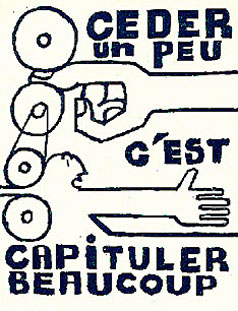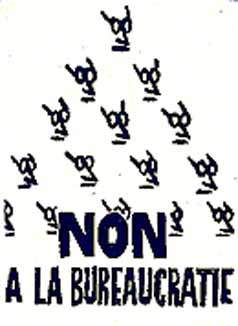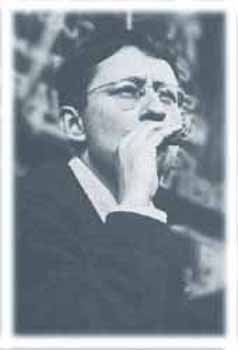What the fuck is he talking about? You want to know? Scroll with the page.
At the end of the century, the KingMonkey is reminding us of a grand tradition that stretches back to the start of the century and is a permanent fixture in society from that time to this.
It's something that goes by a variety of names: dada, lettrism, situationism, punk, and is hosted by a variety of personages: Hugo Ball, Marcel Duchamp, Tristan Tzara, Jean-Isidore Isou, Guy Debord, Raoul Vaneigem, Johnny Rotten, and of course the KingMonkey, approaching what must pass for reality from a variety of perspectives with a variety of aims in mind, and if that sounds nebulous and inconsistent then that is fair enough.
BUT there is a common thread here, a core reaction to cultural strictures made by each of the above (and many others), and it is this:
rising to the challenge of an inert environment
(political/social/artistic)
These people intend to ensure that the world is made different by them and by what they do, and they want other people (hey, that's you and me!) to make that difference with them.
They want what they do here and now (wherever and whenever here and now happens to be) to create change, to invoke response that leads to change, and to inform and incite change in the witnesses to what they say and do. Anything else, anything less just is not good enough.
Dada crawled out of the mess and stupidity of imperial Europe and its casual acceptance of outstanding slaughter in the First World War (an indifference we unfortunately have not shaken off). Through the Cabaret Voltaire, through performance, mask, poetry, noise, the abuse of language, the abuse of audience, the abuse of sensibility, a "no no" to the common, the normal, the ordinary, the dada men and dada women made possible a refusal to be a passive recipient of whatever the "great and the good" deemed you (and that is you and me too today) to be worthy. You could have something else, you could be something else, your art and your poetry and your language and the clothes you wore and the face you made at the world could be something wholly other than that prescribed by "polite society" and its moral and political guardians.
It was a call to revolution, but not in the narrowly economic sense of the marxists nor in the narrowly moral sense of the religious, but was a complete overhaul, an absolute (although there are no absolutes in dada: but that's okay, dada permits contradiction) refusal, new meanings anywhere and everywhere you choose to look: pick what you want to be an object of art, or a word, or music. Get it wherever you want, and make it what you want it be. Marcel Duchamp choose a urinal, signed it, and called it a "readymade"; art because he said so. He also took a bicycle wheel and fixed it upside down to a stool as a revolt against the tyranny of taste and in so doing brought into being a language for the world of artistic expression that was not at the dictate of academics and their schools, their lecture halls, that did not depend on acquiesence to pre-defined standards (Duchamp could care less if anyone agreed with him, but many did). It was no longer "God created man in his own image" but more "We create us in whatever form we feel like at the time." The past tense is lost and the process of creation becomes a spinning top of perpetual renewal; those who chose yes are resurrected from the past which was passive, dull, inert, and they become adored and adorable, because their lives are restored to them, the ownership of their intentions and their motivations, their loves and their demands from the beauty of being alive, are made purely, exclusively, personally theirs.
"People who talk about revolution and class struggle without referring explicitly to everyday life, without understanding what is subversive about love and what is positive in the refusal or constraints, such people have a corpse in their mouth." - Raoul Vaneigem, 'The Revolution Of Everyday Life'.
What the dadaists strove for has been continued through the years; each generation showing that amongst us live those who are prepared to body forth in their lives this new way of meaning and of being.
The Situationists who were born of the post Second World War philosophical trauma that existed throughout Europe (just how the fuck are you supposed to have meaning in a world that contains Treblinka, Belzec and Auschwitz?) drew inspiration from the dadaists and re-affirmed the affirmation to challenge, to revolt and to be in an unceasing state of revolting against the trivial, the passive, the accepting.
The Situationists called "the state as it is" (i.e. political and other establishment structures) the "Spectacle", something they beheld that they abhorred (how close is that word to adored!), and so, in their Manifesto they stated:
"To make the World a sensuous extension of man rather than have man remain an instrument of an alien world, is the goal of the Situationist Revolution. For us the reconstruction of Life and the rebuilding of the World are one and the same desire. To achieve this the tactics of subversion have to be extended from schools, factories, universities, to confront the Spectacle directly. Rapid transport systems, shopping centers, museums, as well as the various new forms of culture and the Media, must be considered as targets for scandalous activity."
Scandalous activity was a speciality of the dadaists, and the situationists challenged themselves and others to re-invogorate that spirit, that determination to ensure change through incitement and wilful disruption. Those they saw with the time and opportunity to do just that were the students of the European universities, and yet here they despaired, seeing only apathy and ignorance in woeful abundance. Driven by anger and the entirely dada intention to seriously piss people off, they wrote "On the Poverty of Student Life" and, while this was written 31 yrs ago, its dissection of the dumbness of so many students remains devastating in its accuracy. They wrote:
"The whole of (the Student's) life is beyond his control, and for all he sees of the World he might as well be on another planet...Every student likes to feel he is a bohemian at heart; but the student bohemian clings to his false and degraded version of individual revolt. His rent-a-crowd militancy for the latest good cause is an aspect of his real impotence...he does have marginal freedoms; a small area of liberty which as yet escapes the totalitarian control of the Spectacle; his flexible working hours permit adventure and experiment. But he is a sucker for punishment and freedom scares him to death: he feels safer in the straightjacketed space-time of the Lecture Hall and the weekly essay. He is quite happy with this open prison organized for his benefit...The Real poverty of his Everyday Life finds its immediate phantastic compensation in the opium of cultural commodities...he is obliged to discover modern culture as an admiring spectator...he thinks he is avant-garde if he's seen the latest Godard or 'participated' in the latest 'happening'. He discovers modernity as fast as the market can provide it: for him every rehash of ideas is a cultural revolution. His principal concern is status, and he eagerly snaps up all the paperback editions of important and 'difficult' texts with which mass culture has filled the bookstore. Unfortunately, he cannot read, so he devours them with his gaze.'"
Now, if you substitute their cultural references, "Godard", the "avant-garde", for statements like "I saw the Stone Roses before anyone else" and "I was into the Verve before you" and "I was watching the Teletubbies before it was cool to do so" I figure you've got a pretty accurate description of UK students now, don't you think (hey, I was one too once!).
"On the Poverty of Student Life" was meant to antagonise, to piss people off, to challenge and incite. It worked. Within 18 months practically every campus in Europe was in a state of riot, and Paris 1968 (now a part of history) was then the most buzzing, most alive, and electrifying place to be. Students from all over Europe flocked to the streets of Paris to be part of this revolution, and became a part of this "call to be", this relentless becoming. Posters (a few on the right of this page) and Statements (a few below here) sprang up all over, changed and renewed on a daily and weekly basis dependent on what was wanted, what those involved wanted things to be, what they would choose.

Emmy Hennings and Hugo Ball
Zurich 1916

Nude Descending a Staircase
(Marcel Duchamp>


Paris 1968 poster

Paris 1968 poster

Information Should Be Free!

No to bureaucracy!

Guy Debord